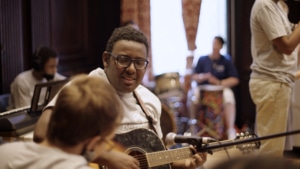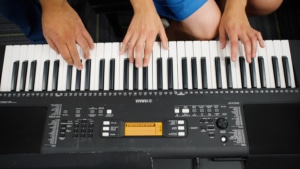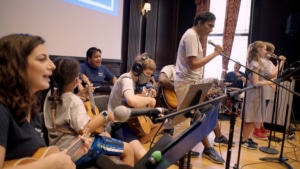Berklee Institute for Accessible Arts Education

The work of the Berklee Institute for Accessible Arts Education (BIAAE) began in 2006 at Boston Conservatory, when I started a small program where 12 individuals with autism received private instrument lessons. Fast forward to today, and the BIAAE, based at Berklee College of Music, provides numerous arts education programs in music, dance, and theater for 300 people with disabilities, ages three to 93, every week of the year, both in person and online. In addition, we offer two graduate programs in Accessible Arts Education – a Master’s degree and a Graduate Certificate – and numerous professional development programs, events, and resources. Our Institute is dedicated to expanding opportunities for people with disabilities of all ages in all aspects of arts education.

The initial motivation for the work of the BIAAE comes from my personal mission to make the arts and arts education a meaningful part of every person’s life. My entire career as an artist, educator, scholar, administrator, and leader has been dedicated to this mission – from starting a music-centered charter school in Boston, to teaching in urban school settings, to providing professional development to educators in a wide range of aspects of pedagogy, curriculum development, and assessment, and much, much more.
At the BIAAE, we strive to reduce and eventually eliminate ABLEism from the arts and arts education. One key aspect of these efforts has to do with our various arts education programs, and the ways that we provide asset-based environments that celebrate and honor what each participating individual can do. Our Music Lessons Program for Adults with Autism is a great example of this: our instructional team differentiates their teaching to meet every individual adult student where they are and to set attainable goals for the student’s music learning. Together, the adult students and their instructors create a safe, welcoming community where magical learning takes place every week. We are thrilled to have the opportunity, thanks to the generous support of the Nancy Lurie Marks Family Foundation, to expand this program to more adults with autism, as well as to offer the program for additional weeks during the year.
We have great expertise in the field Accessible Arts Education at Berklee. Our Graduate Programs in Music Education and Autism are unique in the world. They began in 2014, and since then, dozens of alumni have been making a significant difference in the lives of people with disabilities through providing accessible arts education. Our alumni have also taken leadership roles in their schools, districts, and communities by providing professional development for their colleagues, conducting and reporting research, and serving as an example in their professional settings.

I am one of the leading international experts in Accessible Arts Education. I am fortunate to write and publish numerous articles and book chapters on the topic (and a book is in the works!), to give keynote presentations, workshops, and conference sessions all over the world, and to communicate regularly with a wide and growing network of individuals in the field. Our annual ABLE Assembly: Arts Better the Lives of Everyone Conference is one way that this network is nurtured, as educators, scholars, artists, community members, people with disabilities, and program leaders convene for three days of learning, sharing, and conversations.
The field of Accessible Arts Education and the work of making the arts and arts education accessible to all have been growing and developing over the last 20 years. I am very excited to see what the future holds.
Rhoda Bernard, Ph.D.
Managing Director, Berklee Institute for Accessible Arts Education & Assistant Chair, Music Education
2024
To learn more: Berklee Institute for Accessible Arts Education website
The views expressed in this paper are those of the author(s) and do not necessarily represent the views of the NLM Family Foundation.
